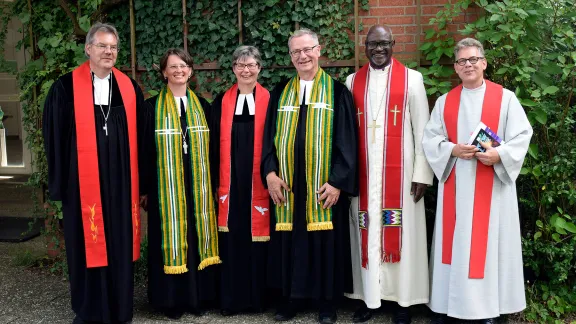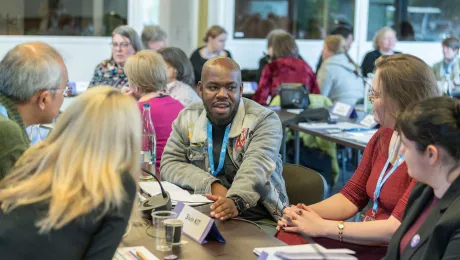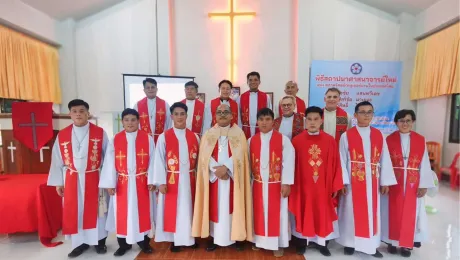
During his visit to âMission EineWeltâ in Neuendettelsau, Germany, LWF President Panti Filibus Musa (2nd from right) also participated in the church service together with the center's directors (from left) Hanns und Gabriele Hoerschelmann during which Ulrike und Reinhard Hansen (Head: Mission and Intercultural Studies, Head: Africa Desk) concluded their duties with the center. Claus Heim (Regional Secretary for Tanzania and Kenya) also participated in the service. Photo: Mission EineWe
LWF President Musa: Waking the Giant empowers local actors to engage in SDGs
(LWI) - „We look back to meaningful cooperation as we walked together with churches and their vocation to participate in God’s mission in their respective contexts. We look forward to deepening our relations of cooperation and support, joining hands wherever we are well placed to do so,“ says Dr Panti Filibus Musa, President of the Lutheran World Federation (LWF) and Archbishop of The Lutheran Church of Christ in Nigeria.
He was speaking on “Waking the Giant – the Lutheran Communion as Actor in a Global Initiative for Justice, Peace and Development” during a study conference of „Mission EineWelt“, the center for partnership, development and mission of the Evangelical Lutheran Church in Bavaria, on 20 July.
Explaining the background to the LWFs Waking the Giant initiative, which lies with the Agenda 2030 with its 17 Sustainable Development Goals (SDGs) adopted in 2015 by 193 member states of the United Nations, Musa stated that this „amounts to a little miracle“.
I see the adoption of the Agenda 2030 and the SDGs almost as a counter-cyclical movement to all what we observe otherwise in the world, which so often seems to be characterized by States disengaging from global cooperation.
„I see the adoption almost as a counter-cyclical movement to all what we observe otherwise in the world, which so often seems to be characterized by States disengaging from global cooperation, and by a certain disillusion from the impact of development aid,“ he explained. „The SDG’s were adopted in a time when the gap between the rich and the poor has increased, when the many achievements of women, as well as those related to gender justice seem to be regressing, when the whole positive dynamic triggered by the Paris Agreement on Climate Change seems to be diluted, and peace seems to be elusive and in danger. Fatalism often prevails, stifling vision, and paralyzing action to address poverty, injustice and conflict in the world.“
Recognition for religious actors
The importance attributed to religious actors in the implementation of the SDGs was something new, Musa recalled. „Only a decade ago, the awareness of the UN system of religious actors as partners was, in general rather low, if there was not even quite a level of suspicion and even rejection towards them.“ Today, however, „they are explicitly recognized“, and their importance is underlined by UN institutions, the World Bank as well as national governments. Consequently, several initiatives are currently taking place to enhance partnerships with faith-based actors in the fields of development, peace, and humanitarian assistance. „Waking the Giant is the LWF’s initiative to respond to this effort,“ Musa said.
Two other aspects related to this are the fact that the Agenda 2030 is a commitment for all states, not only for the countries of the so-called global South and that it is based on a „localization agenda“. This means that local actors are focused on for the implementation of the SDGs. These are „great opportunities for churches,“ Musa insisted. „Waking the Giant is a response to this scenario, seeking to empower churches on the ground to seize this opportunity, connecting, strengthening their role, connecting it with governmental and international, and thereby positioning them in their contexts.“
Additionally, LWFs intention with Waking the Giant is to „ensure that churches are not left behind when it comes to local partnerships, including the allocation of resources that both governments and international structures have set aside for the implementation of the SDGs.“
LWFs holistic mission
Musa also made it clear that „the churches’ vocation to be active in issues of peace, justice, fighting poverty, promoting gender justice and so on does not derive from the existence of an Agenda 2030. The vocation of the church to be engaged in all of this derives from its much deeper, and very unique calling to participate in God’s mission, where all these issues matter so much.“ LWF understands mission in the light of „missio Dei“ as „something that ultimately belongs to God“ with the churches participating in this calling, „joining and offering their gifts and talents as they witness to the transforming presence of the Triune God in this world.“ This is undertaken in a holistic approach, including „proclamation, diakonia, and the public voice – advocacy“ with none of them being „optional“.
Tapping into the „longstanding experience and credibility“ of the churches, LWFs Waking the Giant initiative focuses on five of the 17 SDGs: health (SDG 3), education (SDG 4), gender equality (SDG 5) reducing inequalities (SDG 10) and promotion of peace and justice (SDG 16). From 2018 to 2020 pilot projects are being conducted in Colombia, Liberia, Tanzania and the United States. Musa said that the LWF is already looking at possibilities to expand to additional countries, possibly in Asia. He also extended an invitation to „Mission EineWelt“ to „consider partnering“ with the LWF in this initiative. He pointed out that the LWF had recently made available an „SDG toolbox“ https://wakingthegiant.lutheranworld.org/content/sdg-toolbox-151 that „easily allows churches and related actors to understand the linkages between their ongoing work and specific SDGs.“
Taking up SDG 13 „Climate action“ during a panel discussion at the same event on the „Mission EineWelt“ annual campaign „Creation – not for sale“, Musa stated that „the time to take action was yesterday“ and urged Christians to engage in climate justice. The LWF has been active in this field since 1977.
Waking the Giant
Waking the Giant is a global ecumenical initiative of the Lutheran World Federation. It aims to build the capacity of churches to contribute effectively to the 2030 UN Agenda for Sustainable Development. At the global level, the initiative provides churches and church-related actors with tools and training to relate their on-going work to the Sustainable Development Goals (SDGs). At the national level, churches and ecumenical partners set up implementation mechanisms for taking stock of their existing work in relation to the SDGs and engage in joint planning for direct action and advocacy.


